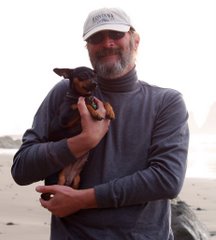On Saturday, January 10th, 1914, Ethel Mae Stephens took her first breath at the family farm north of Parkersburg, West Virginia. It was her mother's thirtieth birthday as Estella Espie McAtee was born on Thursday, January 10th, 1884 also in the Parkersburg area. Grandma always said that momma was the best birthday present she ever received. Momma was born on the family farm, off Five Mile Run Road, north of the city. When I researched the property at the Wood County Court House, I was surprised to find that the farm passed from the Jesse Kincheloe family to my great-grandmother, Mary Elizabeth Stephens, née Phelps, and she in turn passed it on to my grandfather, Olin Orville Stephens. Mother was the fourth of six children, and when she was three, just prior to my Uncle Virgil's birth, the family moved into town, moving to a house that I still think of as Grandma's house in the Beechwood section of Parkersburg.
Momma attended Parkersburg High School, and was proud of the education she received there. Somewhere I have her senior year portrait, but apparently it's not scanned onto this machine, and I cannot find the large print I made and gave her for mother's day several years ago. The print I worked from was in black and white, and when I scanned it originally, I gave it a sepia tone. Mother's reaction, once she stopped crying, was to say "I thought that dress was blue." How would I know? I wasn't there at the time.
I believe my parents met when Mother was a senior. I know the story about the blind date that led to a lifetime love affair, but other than the fact that Mother was 18 years old at the time, I really don't want to go into details. Most of the pictures I have of her show the two of them together. This shouldn't be a surprise as Mother lived with Poppa for 54 years, much longer than she lived with her parents, or alone after Poppa's death.
My parents were married on February 4, 1934, in Parkersburg, and for the first eight years of their marriage, they continued living there. Poppa worked for Ames Baldwin Wyoming, and became foreman of the paint division at the shovel manufacturing plant there. This position allowed my parents to build their own home in Vienna, West Virginia, a suburb of Parkersburg. Poppa always said that the hardest thing he ever had to do in his life was ask Momma to give up their home so he could go to college. Both my parents believed strongly in education, and Poppa had felt the call to the ministry, so they sold their home and moved to Buckhannon, West Virginia where both my parents attended West Virginia Wesleyan College. Poppa graduated in three years, but Momma just completed two. I'm not sure why, although my guess is that she didn't begin her classes right away. When Poppa matriculated at Boston University School of Theology, Momma's professors at WVWesleyan told her that if she could somehow scrape together enough money to pay for one semester's tuition and books, that would be all she'd ever have to pay. She'd surely get a full-ride scholarship to finish her schooling. Unfortunately, that was not possible in 1944. But mother got her education, if not a diploma. She read every text book that Poppa brought home. To this day, Momma remains the smartest person I've ever met, and that includes all the professors I knew at UC Berkeley and The University of Montana. If only she'd had a chance.
Poppa received his STB (Bachelor of Sacred Theology) from Boston University in 1946, and had every intention of returning to the Mountain State. Before they could pack up to leave Massachusetts, a District Superintendent recruiting new ministers asked Poppa, "Why do you want to go back to West Virginia? There's a Methodist Church on every street corner. Come out to Montana where we have wide open spaces and need people to fill them." For whatever reasons, this appealed to my dad, and after driving back to Parkersburg to say good-bye to family and friends, my parents moved West. Poppa's first church out of seminary was in Stevensville, Montana, and both Momma and Poppa fell in love with the Bitterroot Valley.
It must have agreed with them, because three years later, I was born. The pregnancy was difficult. Three different times they rushed Momma to the hospital in Missoula, over thirty miles away in those days. My parents had been married over fifteen years when I was born, and had lost two boys at birth years earlier. The story I grew up with was that the doctors had told Momma she couldn't have children after the second son was born blue. Yet here I am. When I first saw the movie Steel Magnolias, I immediately caught the line from the Christmas Party scene where the other women surround M'Lynn saying "I thought the doctors said Shelby couldn't have children." M'Lynn, played by Sally Fields in the movie, responds "No. They said she shouldn't have children. There's a difference." The next time I saw Momma, I asked if I had misunderstood all these years. That's when I found out parents often change their stories as their children grow. Momma's response to me was "I don't know why you would think that. Your father and I never stopped trying to have children." Well, apart from the fact that no one wants to think of their parents having sex, there was only one reason I had that thought. Someone (Momma!) planted it in my head.
Poppa was busy as a minister. In June, before I was born in October, Bishop Glenn Randall Phillips appointed Poppa to the yoked parish of Laurel-Park City, Montana, some 300 miles east of the Bitterroot and just fifteen miles from Montana's largest city, Billings. While Momma was giving birth to me, Poppa gave birth to a new church building in Laurel. Under his leadership, the Laurel church grew in size to the point where it no longer needed to be yoked to another church. After five years at Laurel, Bishop Phillips appointed Poppa to Mountain View Church in Butte, a church that had been the largest Methodist Church in the state. Both my parents were unhappy in Butte, and after a year and a half, Poppa accepted a special appointment as Executive Vice President at Rocky Mountain College in Billings. And we moved again. We actually moved three times in the three and a half years we lived in Billings, and my parents bought a beautiful home near downtown, but never lived in it. In 1959, Poppa again got wunderlust, and we moved to Stockton, California where Poppa took a position in the President's Office at the University of the Pacific.
The job at Stockton turned out to be not at all what Poppa thought he was applying for, and before the year was out, Poppa asked Bishop Phillips for a church. Phillips was happy to hear from Poppa, saying I need you in Ogden, Utah. Poppa refused to move to Utah with a ten year old son, but Bishop Phillips would not be swayed. "You'll take Ogden or nothing. That's where I need you." Poppa chose to move his membership to California, and we ended up moving to a small farming community 75 miles northwest of Sacramento, Colusa.
Colusa is in the Sacramento Valley and sits right on the Sacramento River. In the summer time it's ungodly hot, and even though the community is a very prosperous faming town, raising primarily rice, almonds and prunes, the people have a poverty consciousness--or at least did back in 1960. When my mother was told "We can't afford the best teachers," she was outraged. She had a son going into junior high school. "How can you afford to have anything but the best teachers," she asked. After two years in Colusa, we moved again. This time to the San Francisco Bay Area, the town of El Cerrito, to be specific.
El Cerrito did have excellent teachers, and my parents, who would never have considered moving to San Francisco prior to this, were happy there. They ended up staying in the Bay Area for eleven years, and moved to California's North Coast in 1973, when Poppa was assigned to the church in Smith River.
Smith River is the last town in California as you head north on US 101 toward Oregon. It sits almost exactly half way between Crescent City, California and Brookings, Oregon. It was while they were in Smith River, that Poppa suffered a series of cardiac arrests that left him mentally damaged and unable to continue his pastorate. For the last twelve years of his life, Momma was his sole care-giver. When he died in 1988, I fully expected Momma to follow him to the grave. They had been married for 54 years. Her comment was "I'd gladly give him another 54."
As long as Poppa was alive, I never heard Momma complain about anything, but after his death I did learn just how hard it had been for her living with him. More to the point, following him from church to church, town to town, state to state. All of Momma's siblings died in the same town where they were all born. Where my grandparents were born. Where at least some of my great-grandparents were born. Most of my cousins living and dead never left Parkersburg. Following her gypsy husband all over the country had to be difficult. I do remember hearing Momma say "I want to go home. I just don't know where home is." I tried to get Momma to go back to West Virginia with me before my cousins Betty Lee and Lucille died, but Momma wouldn't hear of it. She was settled now, and that was that.
Ethel Mae Spellman died the Saturday after Thanksgiving, November 25th, 2006. I miss her dearly to this day and I always will. The best mother anyone could ever have. By the way, the color photograph above of Mother and me on the Boulder River was taken by my father, a very talented amateur photographer. It's my favorite of all the hundreds of photos I have of his.













